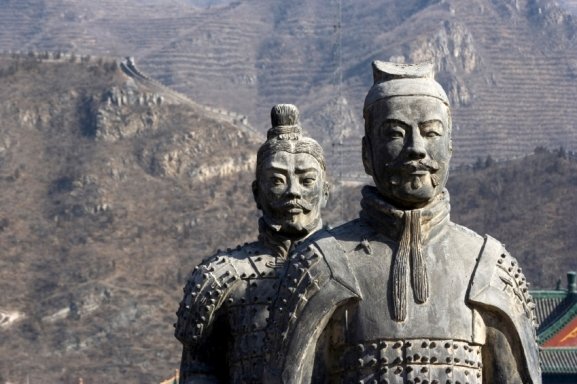Expected soft landing has fund giant buying undervalued stocks in the PRC and other BRICs; policy shift seen
Pacific Investment Management Co. has been buying raw-materials producers and Chinese industrial companies, some of the world's worst-performing stocks (MXEF) this year, as policy makers in the fastest-expanding major economy move to bolster growth.
China, which reduced the amount banks must keep in reserve by half a percentage point to 21 percent on Nov. 30, may cut the ratio by as much as three percentage points in the next 12 months, Masha Gordon, the head of emerging markets equity portfolio management at Pimco, which oversees about $1.35 trillion worldwide, said in an interview. Inflation in the nation may slow to between 3 percent and 4 percent from 5.5 percent in October, she said.
“We've seen the first clear shift from tightening to selective easing on the monetary side in China,” Gordon said by phone in London yesterday.
China's central bank is cutting lenders' reserve requirements for the first time since 2008 as the European debt crisis curbs demand for exports and inflation slows from a three-year high. MSCI Inc. (MSCI)'s gauges of raw-materials and industrial stocks in emerging markets, the worst performers among 10 industry groups this year, have rallied more than 5 percent since China announced the policy shift. The Hang Seng China Enterprises Index (HSCEI) surged 8.1 percent.
‘Defensive Bias'
“We started with light positioning in the cyclicals and have been selectively adding to companies in the materials and industrial space where we believe valuations are pricing in extreme distress,” Gordon said. Some stocks tied to economic growth in developing nations “are very cheap relative to their average earnings power if you take the view that growth in emerging markets on a secular basis isn't coming to a halt,” she said, without naming any specific companies.
The MSCI Emerging Markets Materials Index trades at about 8.6 times analysts' profit estimates, or 24 percent lower than the average ratio of 11.4 since Bloomberg began compiling the data in 2006. The MSCI Emerging Markets Industrials Index is valued at a 17 percent discount to its five-year average, the data show. MSCI's gauge of Chinese industrial stocks trades at 9.4 times profit estimates, down from a historical mean of 16.
Gordon, who runs the PIMCO EqS Emerging Markets Fund, said she has a “defensive bias” for the overall fund and is using options to hedge against potential “extreme” market declines.
‘Cushion the Downturn'
The MSCI Emerging Markets Index, a benchmark for stocks in 21 developing countries, has dropped 17 percent this year. The emerging-market raw-materials index has declined 24 percent and the industrials gauge (MXCN0IN) has lost 27 percent. The Hang Seng China Enterprises Index, which tracks Chinese companies traded in Hong Kong, is down 19 percent.
The MSCI emerging-market index rose 0.1 percent at 8:44 a.m. in London. The raw-materials gauge gained 0.1 percent and the industrials index increased 0.2 percent. The Hang Seng China index climbed 0.7 percent.
Chinese manufacturing contracted last month for the first time since February 2009 as the property market cooled and exports slowed. The Purchasing Managers' Index fell to 49 from 50.4 in October, the China Federation of Logistics and Purchasing said in a statement yesterday.
China's reserve ratios will be decreased by 0.5 percentage point effective Dec. 5, the central bank said on Nov. 30. The move may add 350 billion yuan ($55 billion) to the financial system, according to UBS AG.
Brazilian Banks
“Given policy flexibility and a generally healthy state of government finances, China does have scope to cushion the downturn through fiscal and selective monetary easing,” Gordon said. “The key, as always, is whether policy makers manage to stay ahead of the market. This may prove to be challenging.”
Gordon also sees buying opportunities in Brazil, where policy makers cut borrowing costs by 50 basis points, or 0.5 percentage point, for a third straight meeting on Nov. 30. Gordon said that she's been “selectively adding” to shares of Brazilian financial companies after valuations declined this year on concern that slower economic growth and rising loan losses would curb profits.
Brazil's Bovespa index (IBOV) jumped to a two-week high yesterday after the government eliminated a tax on foreigners' stock purchases and the central bank's rate cut boosted confidence in the economy. Itau Unibanco Holding SA, Brazil's biggest bank by market value, climbed 3.9 percent.
Pimco, known for its bond funds run by Bill Gross for almost four decades, hired former U.S. Treasury official Neel Kashkari in December 2009 to oversee its push into stock funds. Gordon joined Pimco last year from Goldman Sachs Group Inc.'s asset-management unit.
The PIMCO EqS Emerging Markets Fund declined 20 percent from the end of March through Nov. 30, compared with a 21 percent drop in the MSCI emerging markets index, according to data compiled by Bloomberg.
--Bloomberg News--







